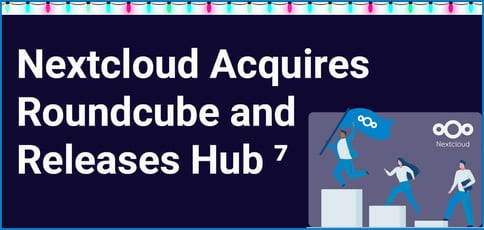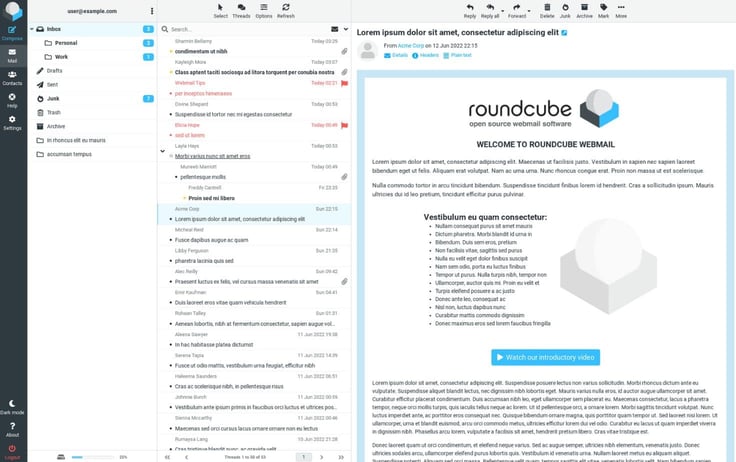
TL; DR: If data privacy is at the top of your list, Nextcloud can help you safeguard your data from third-party tracking and snooping with its on-premises collaboration and productivity software. Unlike cloud-based service providers, Nextcloud’s primary job is to provide software and allow users to self-host wherever they please. Nextcloud recently announced the release of Nextcloud Hub 7, which will provide users with more privacy-first capabilities. It also acquired Roundcube, helping advance the mission of digital autonomy and free software everywhere.
About 49% of Americans think websites ask for too much information, according to a survey done by HostingAdvice. This is only the tip of the iceberg. Users also have other online privacy concerns. Among them are lack of HTTPS/encryption, adware, third-party data tracking, and zero anonymity.
But there is an irony to this data privacy debacle. Early internet promoters had sought to make the web a place that could be free from the powers that be. A place where people can join, have free access to information, and live in anonymity without rules or tracking.
The internet has become the opposite of that dream. Companies are instead harvesting information and creating complete digital profiles of users to accomplish their marketing goals. And the patchwork of government restrictions haven’t been able to stop them.

But users can take back control by using a proactive approach. Privacy-first tools can help users protect their data in almost every aspect, whether at work or shopping online. One platform helping on this front is Nextcloud. It offers a privacy-first and on-prem collaboration suite, which can serve as a free alternative to the cloud-based Google Workspace and Microsoft 365.
Nextcloud recently merged with Roundcube, a web-based email client built on privacy and data security. This merger helps expand Nextcloud’s capabilities and advance its mission toward digital autonomy and decentralization for users. Nextcloud also released the most recent version of its platform, Hub 7, providing tons of new features and functionality.
“This release underscores Nextcloud’s unwavering commitment to providing a secure, efficient, and integrated productivity platform,” said Frank Karlitschek, CEO and Founder of Nextcloud.
Roundcube Helps the Push for Digital Sovereignty
Nextcloud makes conscious efforts to create solutions that keep data control where it’s meant to be: in the user’s hands. This is why Nextcloud is a software company, not a service provider. It allows users to host its software where they want, enabling them to protect their data within their own infrastructure.
Digital sovereignty and autonomy are primary drivers of Nextcloud’s mission. Too many modern tools have access to user data, and they continue to become more and more centralized. Data in big tech companies are typically not under user control. Frank started Nextcloud in 2010 to combat this issue and concerns surrounding data privacy in the cloud.
This is why Thomas Brüderli, Roundcube founder, determined that Nextcloud would be the perfect home for the mail client after he stepped down as the maintainer. “Both projects share the same ideology about the role and importance of free software as an independent alternative to the big cloud services,” said Thomas.

Roundcube and Nextcloud share many similarities. They are both free, open-source, and secure. But it’s important to note that they will remain separate entities, and Nextcloud won’t absorb it. Although open-source projects don’t merge often, Thomas knew Nextcloud would be the best option.
“Roundcube is free software at heart, and giving its control to a business and service-oriented entity never was an option. I want the software to remain as open and general-purpose as it is today, and I don’t think that a big company can take over that spirit,” said Thomas.
Roundcube fits right in with Nextcloud. And Nextcloud already has some plans in the works. Over the next year, Nextcloud will invest in Roundcube, accelerate development, and work with its open-source community. “The merger not only underscores the collective strength of the open-source community but also highlights our enduring commitment to privacy, security, and user empowerment,” said Frank.
Nextcloud Hub 7 Extends Capabilities for Users
The Roundcube acquisition hasn’t been the only thing on Nextcloud’s radar. Nextcloud Hub 7 launched on Dec 12, 2023 and comes with a host of new features to enhance experience and collaboration.
Since Nextcloud is a unified platform, it added improvements to its unified search, providing a dedicated dialog with filter options to find emails, documents, chat messages, calendar appointments, contacts, and external data anywhere you are on the platform. This feature allows users to search through every application in one place.

Another highlight is its global out-of-office feature. Users can now apply their out-of-office status across Nextcloud applications, including its email, calendar, and chat tools.
Some of its other improvements include:
- Nextcloud Files was rewritten in Vue.js, delivering accessibility and interface improvements.
- Photos can show iOS Live Photos, photo location, and camera settings.
- App distribution and deployment are improved for Docker-based apps, with support for apps written in other languages — Go, Python, Rust, etc — along with a new app store overhaul.
- Nextcloud Talk introduces telephone dial-out to the existing dial-in capabilities, tracks video recording consent, and offers a “Note to self” chat.
And the features keep coming. We’ll cover Nextcloud’s AI features next.
Integrating AI Without Compromising on Data Privacy
Nextcloud also integrated more AI features in its Hub 7 release. It has introduced Aleph Alpha, a Large Language Model it collaborated on with the German state of Schleswig-Holstein. This LLM will help quell any fears associated with data privacy and AI by allowing users to have remote AI services and keep their data in Europe.
The Nextcloud team doesn’t stray from its privacy-first vision and has made intentional moves to ensure secure AI integration. The team performs ongoing research and navigates new AI challenges to evolve its AI offerings through every Hub release. For example, in this release, Nextcloud updated its setting to allow administrators to limit the usage of AI functionality.

As for other updates, Nextcloud continues to work on more AI solutions and has launched a preview of its Context Chat feature in the Hub 7 release. This powerful feature is a part of the Nextcloud AI Assistant and uses a local vector database and LLM to power its functionality. Users can leverage Context Chat to answer questions about documents, chats, and emails.
“Organizations worldwide are increasingly recognizing the importance of secure and collaborative platforms to manage their data and communications effectively. Nextcloud Hub 7, as an open-source solution, provides organizations with a powerful tool that prioritizes privacy and data sovereignty,” said Andy Scherzinger, Director of Engineering at Nextcloud, in their latest press release.


